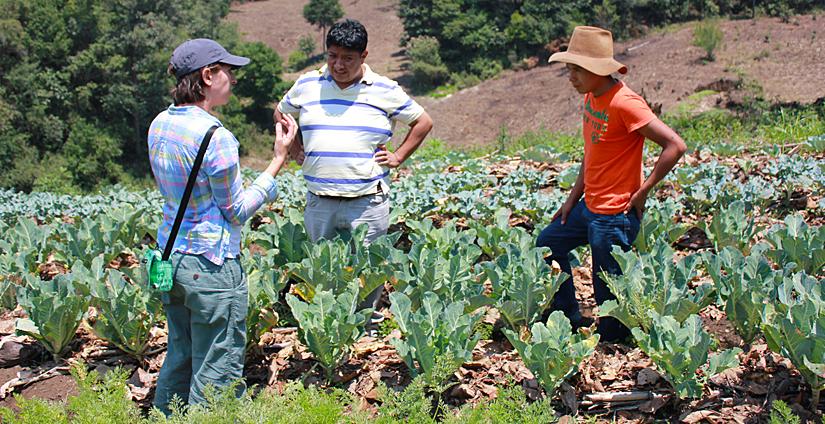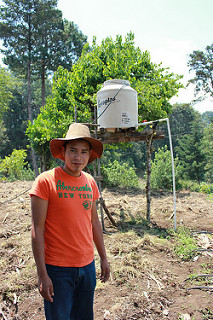
Expanding irrigation and climate-smart farming to Guatemala
An international team led by UC Davis is working to connect 9,000 rural households in Guatemala with improved water management and climate-smart agriculture strategies, to increase food security and reduce poverty.
Called MásRiego (“more irrigation”), the project aims to increase farmers’ incomes and their use of climate-smart strategies, including drip irrigation, rainwater harvesting, reduced tillage, mulch use and diverse crop rotation. To enable farmers to adopt these new practices, the team will not only provide trainings but also build partnerships to increase farmers’ access to needed microcredit financing and irrigation equipment.
“The opportunity to impact so many farmers’ lives on this scale is exciting,” said Beth Mitcham, director of the Horticulture Innovation Lab. “We’re taking lessons learned from our previous research — in Guatemala, Honduras and Cambodia — and building a team to help more small-scale farmers apply our findings and successfully use these innovative practices.”
The new project is part of the U.S. government’s Feed the Future initiative. It represents an additional $3.4 million investment in the UC Davis-led Horticulture Innovation Lab by the U.S. Agency for International Development’s mission in Guatemala.
Partnering with UC Davis is an international team with representatives from Centro de Paz Bárbara Ford in Guatemala; Universidad Rafael Landívar in Guatemala; the Panamerican Agricultural School, Zamorano, in Honduras; Kansas State University; and North Carolina Agricultural and Technical State University.
Moving forward with ag, youth, climate resiliency
The new MásRiego project will focus on helping farmers, particularly women and youth, grow high-value crops on very small plots of land (200 square meters minimum).

By partnering with local youth groups and agricultural schools, the international team will better prepare students for jobs in commercial agriculture and agricultural extension with understanding of climate-resilient conservation and water management practices.
“Our local team is training youth as entrepreneurs, to see agriculture as an economic opportunity instead of just back-breaking work,” said Meagan Terry, UC Davis junior specialist who is managing the project in Guatemala for the Horticulture Innovation Lab. “They can envision a future in agriculture, with innovative ways to create value-added products or grow high-value crops for niche markets.”
As rainfall patterns vary with climate change, farmers in this region are expected to face increased competition for water. Practices such as rainwater harvesting, drip irrigation and conservation agriculture will become more necessary for small-scale farmers.
So far the project team has built demonstration gardens and trained members of a local youth cooperative in using mulch, water management, and maintaining a vegetable garden. The team is currently hiring local staff and beginning a baseline survey to better diagnose current irrigation practices, current vegetable production, farmer needs and market demand.
Climate-smart lessons learned
In previous research, the Horticulture Innovation Lab has found that combining drip irrigation with conservation agriculture practices can successfully grow vegetables on small plots of land, without significant yield reductions. These practices improve soil structure, moisture retention and soil health.
Additionally, women farmers who participated in the Horticulture Innovation Lab studies in Cambodia, Honduras and Guatemala favored using these practices for another important reason: reduced labor in relation to controlling weeds, vegetable bed preparation and manual watering.
These lessons, as well as findings from the program’s “Advancing Horticulture” report about horticultural sector growth in Central America, lay the foundation for this new project.
This announcement was originally published as a press release by UC Davis News Service.
The Horticulture Innovation Lab is led by a team at UC Davis, with funding from USAID as part of Feed the Future, the U.S. government’s global hunger and food security initiative. The program builds international partnerships for fruit and vegetable research that improves livelihoods in developing countries.
Top photo: Meagan Terry, left, discusses conservation agriculture with a Guatemalan consultant and a local youth group member. (Horticulture Innovation Lab photos by Beth Mitcham)
More information:
- Project details: Promoting drip irrigation and climate resilience
- ‘Advancing Horticulture’ report findings: Assessment of constraints to horticultural sector growth in Central America
- Related blog post: Building partnerships for new irrigation project
- Related blog post: 14 steps to growing vegetables with conservation agriculture and drip irrigation
- Related blog post: Reducing drudgery while improving soil for Cambodian vegetable farmers
